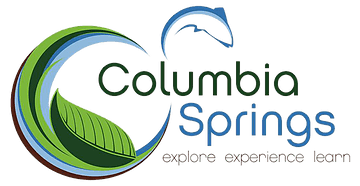Researchers Malia Pownall and Talia Schmitt observing a field trip at Columbia Springs.
What makes a great environmental education program? Malia Pownall and Talia Schmitt are traveling across the county to find the answer.
They are part of a research team from Clemson University and Virginia Tech that began in 2018, setting out on an ambitious mission to observe hundreds of environmental education field trip programs and track outcomes for students. Do these programs make students want to spend more time outside? Do students feel empowered after participating? Do students feel inspired to take action to help the environment after a program? These were just some of the questions asked as researchers spent months out in the field with thousands of students, making observations and conducting surveys.
After the data was analyzed and the numbers crunched, a picture began to emerge: Yes, environmental education programs were having a profound impact on students. But researchers also found that across the spectrum of different programs, not all programs were achieving the same level of high outcomes, and not all programs were reaching a diverse group of students. From the vast group of programs observed in 2018, a smaller subset was identified — programs that were successfully achieving above average outcomes for students while also serving a diverse student population. These top performing programs grabbed Talia and Malia’s attention. What were they doing differently?
Identified as one of these top performing field trip programs, Columbia Springs was invited to participate in the next phase of the study. In February 2022, Malia and Talia and the rest of their team hit the road, bouncing from Florida and Ohio, to Texas and California and everywhere in between, including a scheduled week here in Vancouver, WA to observe the science and nature field trips at Columbia Springs.
“We’re looking for the secret sauce,” Malia says. “We got the numbers in 2018 and now we’re back because we want the stories behind those numbers. What are the teaching methods being used? What is the larger context for a successful program?”
For Malia, who has worked in urban non-profit environmental education and is finishing up her master’s degree, her questions center on Culturally Responsive Teaching and how it can be implemented successfully in environmental education programs. For Talia, a professional outdoor educator with over 10 years of experience, the chance to see and learn from so many other programs was hard to pass up.
“We’re not only learning from all the educators we see, but we are being exposed to so many different organizational cultures—it’s the people behind the programs that have been the most interesting,” says Malia.

Malia Pownall and Talia Schmitt are traveling the country researching what makes great environmental education programs.
While the formal research won’t be completed and published for several months, we couldn’t resist asking for some off-the-cuff observations from the experts. What stood out to them about the programs here at Columbia Springs?
“We noticed that at Columbia Springs there is a lot of content clarity, with lots of visuals for students to follow, “ noted Talia. “We saw great examples of lesson sequencing, transitions and opportunities for students to apply their knowledge with hands-on projects.”
“The use of reflection throughout the program stood out to me,” said Malia. “There is a ton of research that shows reflection is a critical part of learning, so that was great to see. The inclusion of questions that guide students to think about what they did well, for example, leads to really holistic learning.”
Many thanks to Talia and Malia for their hard work and great insights. It was fun to have them join our crew for the week. We will share their research when it becomes available.
If you’d like to check out some of the papers published from the first round of research in 2018, click the button below!

